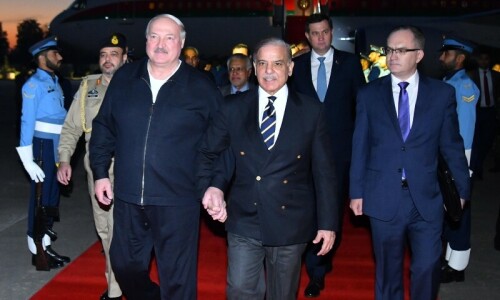For more than a hundred years, Fata has been governed by the Frontier Crimes Regulations (FCR). Today, however, these provisions have become an ugly anachronism and it is time for them to go.
The FCR of 1901 is a piece of legislation dating back to British colonial times. The Regulations were implemented to apply to northwestern British India. Under the FCR, executive, judicial and administrative functions for each of the seven agencies rest in the hands of a federally appointed Political Agent (PA). The PA may exercise his judicial authority by organising a tribal council or jirga that decides the fate of an accused person. The FCR also allows the PA to collectively punish an entire tribe for any wrongs committed on its territory. Recently, there has been talk of amending the FCR. Unfortunately, apart from a few minor changes, the colonial legacy continues as before. The FCR is causing problems not only in the legal and administrative integration of Fata with the rest of Pakistan, but it also has a number of human rights implications for the people of the tribal agencies. Further, parts of the FCR do not coincide with the Constitution, as well as with international human rights conventions that Pakistan is a party to, and rules of customary international law. Rules of customary international law may not be codified into law, but because they are observed by a majority of nations, they are a kind of “rules of the game” that all countries are obliged to follow.
For starters, the FCR does not give an accused person the right of appeal in a regular court of law, or the right to legal representation. Under the Regulations, justice is to be dispensed by tribal jirgas. Decisions of jirgas can not be appealed in ordinary courts. The danger of impartiality looms dangerously as jirgas do not have a defined set of procedural rules, as in a regular court. Jirga members may easily be influenced by many factors, including the wealth, power and social status of the parties.
The FCR clearly goes against the right to a fair trial enshrined in the Constitution, as well as in numerous international human rights conventions. Article 25 of the Constitution provides for equality before law and equal protection of the law while Article 10 calls for the right to a fair trial.
Under the Universal Declaration of Human Rights (UDHR), “everyone has the right to an effective remedy by the competent national tribunals”; “no one (is to be) subject to arbitrary arrest, detention and exile”; and “everyone is entitled…to a fair and public hearing by an independent and impartial tribunal.” The International Covenant on Civil and Political Rights (ICCPR) has similar provisions, including the right to liberty and security of the person. Neither jirgas, nor the office of the political agent can be called an independent and impartial court.
The collective punishment clause of the FCR abrogates international human rights norms as well. Collective punishment is prohibited under the third Geneva Convention of 1949. According to Amnesty International, during the military operations in South Waziristan in October 2009, the military denied access to members of the Mehsud tribe to major roads as they tried to escape the conflict zone and reach humanitarian aid. Tribe members included women and children. Imposing fines and demolishing the homes of tribesmen are other ways in which people are collectively punished.
Given the fact that children may be, and often are, subjected to the collective responsibility clause, the Regulations violate the Convention on the Rights of the Child. To be sure, the FCR also discriminates against women as they do not have access to tribal councils. It abrogates the provision of the International Convention on the Elimination of all forms of Discrimination against Women (CEDAW) that requires Pakistan to “accord to women equality with men before the law.” Because women have no real social status in this region, jirgas tend to be biased and give rulings that are not in favour of women. Women clearly do not have “equal protection of the law” as provided in the Constitution.
Since the FCR abrogates numerous human rights norms, it is clearly time to abolish it. Those who defend the status quo may argue that the FCR encapsulates tribal customs and that even if the FCR is abolished, these customs would continue. However, there would be no reason for such customs to exist if the writ of the state is allowed to extend to the tribal agencies, as the state’s judicial institutions would render jirgas irrelevant. The FCR has helped in creating conditions for an abusive insurgency. It is a system where individuals, and not institutions, have power over other individuals, and thus undermines democracy and the rule of law. Since Fata is an integral part of the country, it is time that the laws of Pakistan reflect this reality.
Aamenah Yusafzai has recently graduated from the Georgetown University Law Center.
The views expressed by this blogger and in the following reader comments do not necessarily reflect the views and policies of the Dawn Media Group.











































